BSBINN601: Workbook for Leading and Managing Organisational Change
VerifiedAdded on 2023/06/07
|91
|17190
|444
Homework Assignment
AI Summary
This document is a comprehensive workbook for the BSBINN601 unit, focusing on leading and managing organisational change. It includes various assessment tasks, such as workbook activities, skills activities, knowledge activities (Q&A), and a performance activity. The workbook covers topics like identifying change requirements, developing change management strategies, implementing changes, and evaluating change programs. It also contains instructions for learners, assessment criteria, and an assessment record tool. The assessment tasks evaluate the student's ability to analyze organizational environments, develop change plans, communicate changes, and address barriers. Furthermore, the workbook highlights the importance of foundation skills like reading, writing, communication, and problem-solving in the context of change management. The student is assessed on their understanding of the change management process, strategies for communicating change, and potential barriers to change. The workbook is designed for students at Clinton Institute, providing a structured approach to learning and assessment in organizational change management.
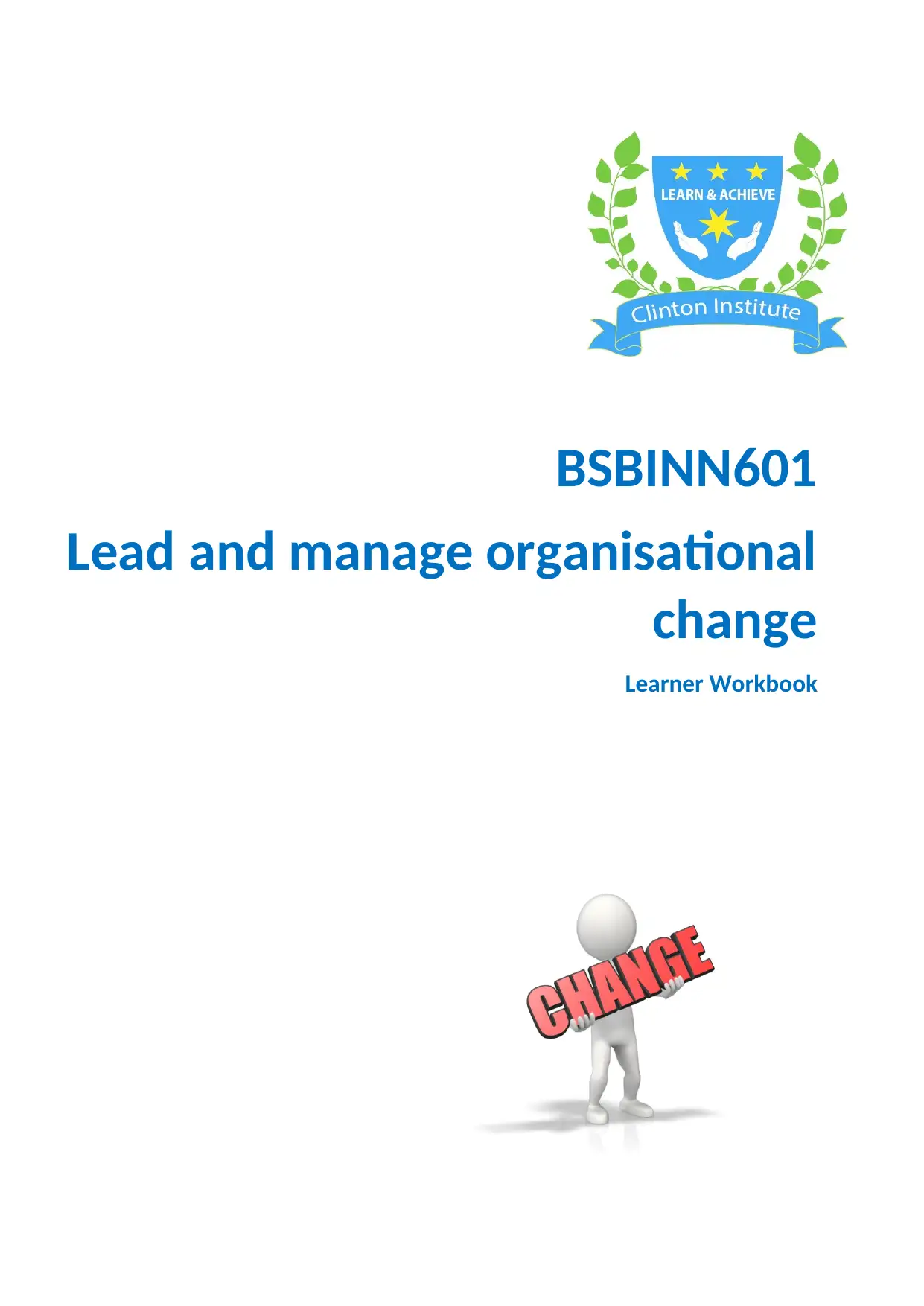
BSBINN601
Lead and manage organisational
change
Learner Workbook
Lead and manage organisational
change
Learner Workbook
Paraphrase This Document
Need a fresh take? Get an instant paraphrase of this document with our AI Paraphraser
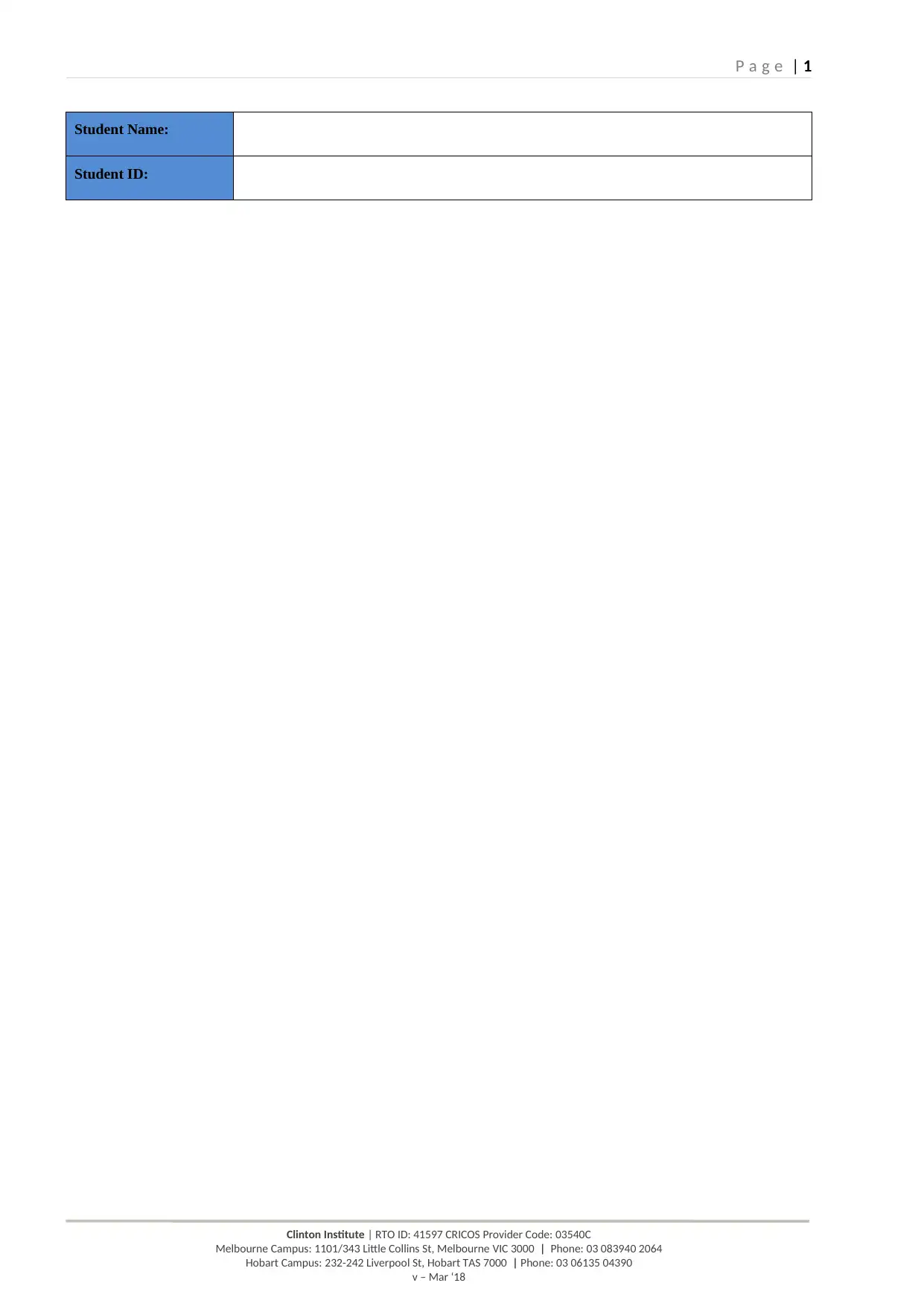
P a g e | 1
Student Name:
Student ID:
Clinton Institute | RTO ID: 41597 CRICOS Provider Code: 03540C
Melbourne Campus: 1101/343 Little Collins St, Melbourne VIC 3000 | Phone: 03 083940 2064
Hobart Campus: 232-242 Liverpool St, Hobart TAS 7000 | Phone: 03 06135 04390
v – Mar ‘18
Student Name:
Student ID:
Clinton Institute | RTO ID: 41597 CRICOS Provider Code: 03540C
Melbourne Campus: 1101/343 Little Collins St, Melbourne VIC 3000 | Phone: 03 083940 2064
Hobart Campus: 232-242 Liverpool St, Hobart TAS 7000 | Phone: 03 06135 04390
v – Mar ‘18
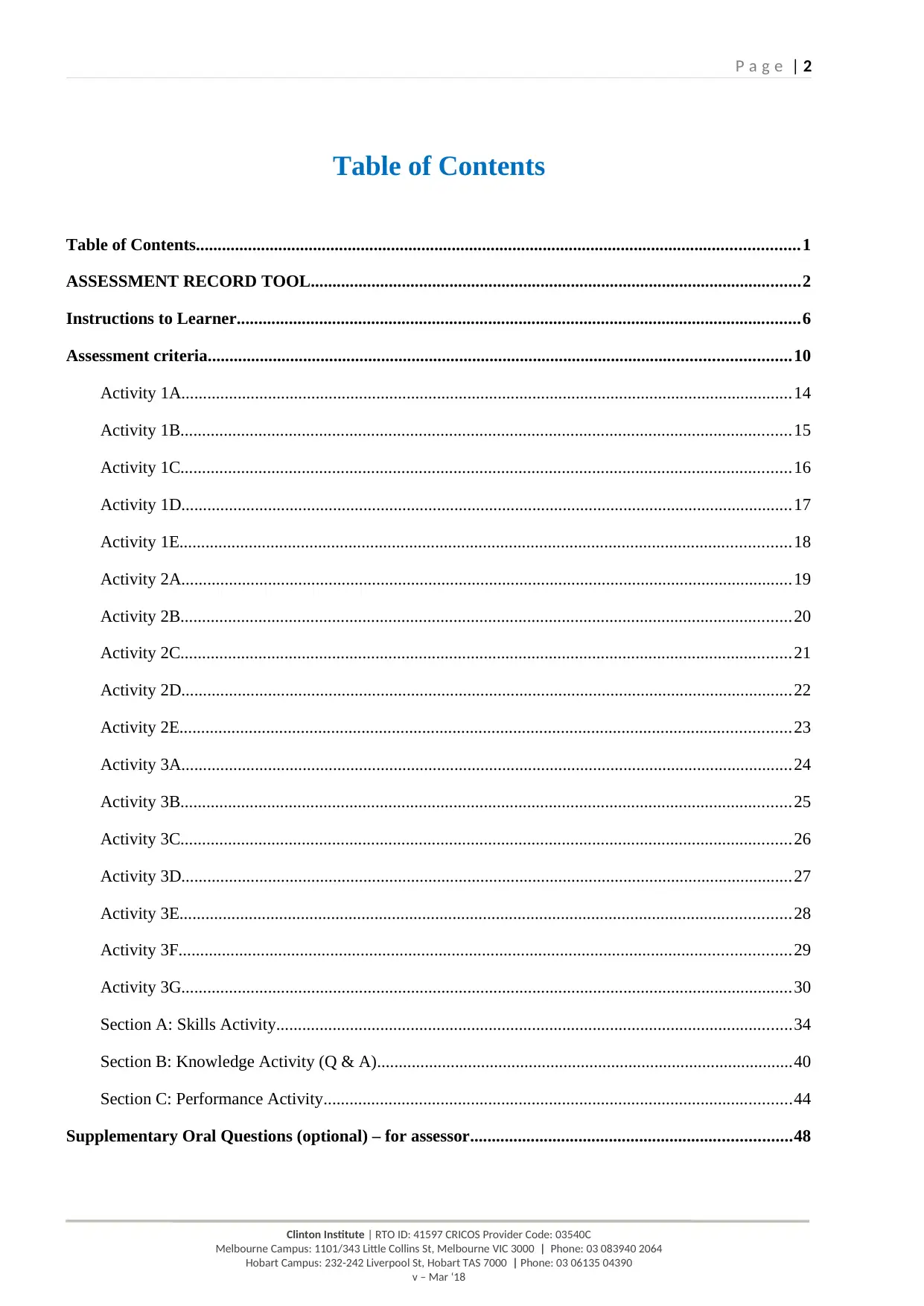
P a g e | 2
Table of Contents
Table of Contents...........................................................................................................................................1
ASSESSMENT RECORD TOOL.................................................................................................................2
Instructions to Learner..................................................................................................................................6
Assessment criteria......................................................................................................................................10
Activity 1A.............................................................................................................................................14
Activity 1B.............................................................................................................................................15
Activity 1C.............................................................................................................................................16
Activity 1D.............................................................................................................................................17
Activity 1E.............................................................................................................................................18
Activity 2A.............................................................................................................................................19
Activity 2B.............................................................................................................................................20
Activity 2C.............................................................................................................................................21
Activity 2D.............................................................................................................................................22
Activity 2E.............................................................................................................................................23
Activity 3A.............................................................................................................................................24
Activity 3B.............................................................................................................................................25
Activity 3C.............................................................................................................................................26
Activity 3D.............................................................................................................................................27
Activity 3E.............................................................................................................................................28
Activity 3F.............................................................................................................................................29
Activity 3G.............................................................................................................................................30
Section A: Skills Activity.......................................................................................................................34
Section B: Knowledge Activity (Q & A)................................................................................................40
Section C: Performance Activity............................................................................................................44
Supplementary Oral Questions (optional) – for assessor..........................................................................48
Clinton Institute | RTO ID: 41597 CRICOS Provider Code: 03540C
Melbourne Campus: 1101/343 Little Collins St, Melbourne VIC 3000 | Phone: 03 083940 2064
Hobart Campus: 232-242 Liverpool St, Hobart TAS 7000 | Phone: 03 06135 04390
v – Mar ‘18
Table of Contents
Table of Contents...........................................................................................................................................1
ASSESSMENT RECORD TOOL.................................................................................................................2
Instructions to Learner..................................................................................................................................6
Assessment criteria......................................................................................................................................10
Activity 1A.............................................................................................................................................14
Activity 1B.............................................................................................................................................15
Activity 1C.............................................................................................................................................16
Activity 1D.............................................................................................................................................17
Activity 1E.............................................................................................................................................18
Activity 2A.............................................................................................................................................19
Activity 2B.............................................................................................................................................20
Activity 2C.............................................................................................................................................21
Activity 2D.............................................................................................................................................22
Activity 2E.............................................................................................................................................23
Activity 3A.............................................................................................................................................24
Activity 3B.............................................................................................................................................25
Activity 3C.............................................................................................................................................26
Activity 3D.............................................................................................................................................27
Activity 3E.............................................................................................................................................28
Activity 3F.............................................................................................................................................29
Activity 3G.............................................................................................................................................30
Section A: Skills Activity.......................................................................................................................34
Section B: Knowledge Activity (Q & A)................................................................................................40
Section C: Performance Activity............................................................................................................44
Supplementary Oral Questions (optional) – for assessor..........................................................................48
Clinton Institute | RTO ID: 41597 CRICOS Provider Code: 03540C
Melbourne Campus: 1101/343 Little Collins St, Melbourne VIC 3000 | Phone: 03 083940 2064
Hobart Campus: 232-242 Liverpool St, Hobart TAS 7000 | Phone: 03 06135 04390
v – Mar ‘18
⊘ This is a preview!⊘
Do you want full access?
Subscribe today to unlock all pages.

Trusted by 1+ million students worldwide

P a g e | 3
Clinton Institute | RTO ID: 41597 CRICOS Provider Code: 03540C
Melbourne Campus: 1101/343 Little Collins St, Melbourne VIC 3000 | Phone: 03 083940 2064
Hobart Campus: 232-242 Liverpool St, Hobart TAS 7000 | Phone: 03 06135 04390
v – Mar ‘18
Clinton Institute | RTO ID: 41597 CRICOS Provider Code: 03540C
Melbourne Campus: 1101/343 Little Collins St, Melbourne VIC 3000 | Phone: 03 083940 2064
Hobart Campus: 232-242 Liverpool St, Hobart TAS 7000 | Phone: 03 06135 04390
v – Mar ‘18
Paraphrase This Document
Need a fresh take? Get an instant paraphrase of this document with our AI Paraphraser
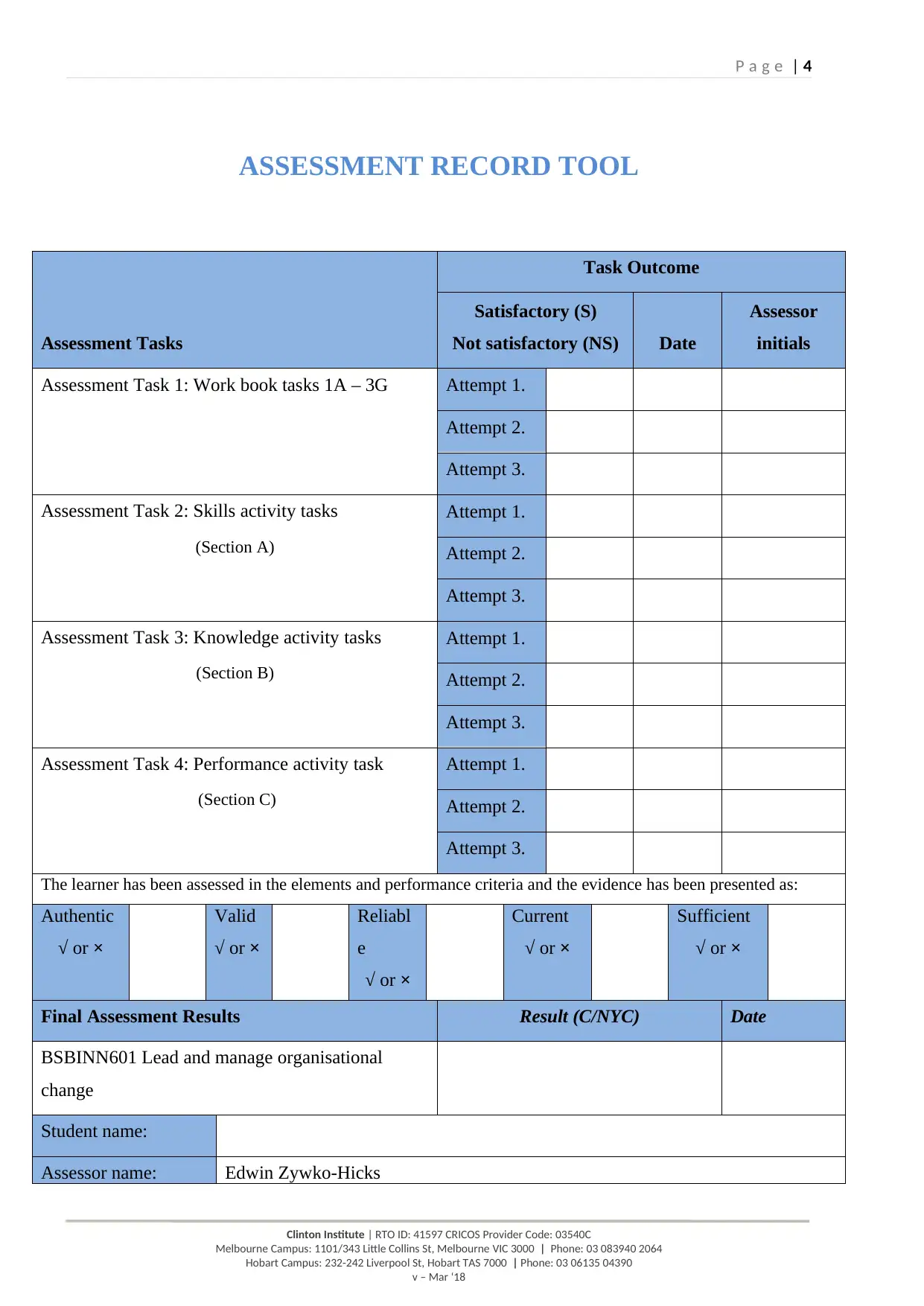
P a g e | 4
ASSESSMENT RECORD TOOL
Assessment Tasks
Task Outcome
Satisfactory (S)
Not satisfactory (NS) Date
Assessor
initials
Assessment Task 1: Work book tasks 1A – 3G Attempt 1.
Attempt 2.
Attempt 3.
Assessment Task 2: Skills activity tasks
(Section A)
Attempt 1.
Attempt 2.
Attempt 3.
Assessment Task 3: Knowledge activity tasks
(Section B)
Attempt 1.
Attempt 2.
Attempt 3.
Assessment Task 4: Performance activity task
(Section C)
Attempt 1.
Attempt 2.
Attempt 3.
The learner has been assessed in the elements and performance criteria and the evidence has been presented as:
Authentic
√ or ×
Valid
√ or ×
Reliabl
e
√ or ×
Current
√ or ×
Sufficient
√ or ×
Final Assessment Results Result (C/NYC) Date
BSBINN601 Lead and manage organisational
change
Student name:
Assessor name: Edwin Zywko-Hicks
Clinton Institute | RTO ID: 41597 CRICOS Provider Code: 03540C
Melbourne Campus: 1101/343 Little Collins St, Melbourne VIC 3000 | Phone: 03 083940 2064
Hobart Campus: 232-242 Liverpool St, Hobart TAS 7000 | Phone: 03 06135 04390
v – Mar ‘18
ASSESSMENT RECORD TOOL
Assessment Tasks
Task Outcome
Satisfactory (S)
Not satisfactory (NS) Date
Assessor
initials
Assessment Task 1: Work book tasks 1A – 3G Attempt 1.
Attempt 2.
Attempt 3.
Assessment Task 2: Skills activity tasks
(Section A)
Attempt 1.
Attempt 2.
Attempt 3.
Assessment Task 3: Knowledge activity tasks
(Section B)
Attempt 1.
Attempt 2.
Attempt 3.
Assessment Task 4: Performance activity task
(Section C)
Attempt 1.
Attempt 2.
Attempt 3.
The learner has been assessed in the elements and performance criteria and the evidence has been presented as:
Authentic
√ or ×
Valid
√ or ×
Reliabl
e
√ or ×
Current
√ or ×
Sufficient
√ or ×
Final Assessment Results Result (C/NYC) Date
BSBINN601 Lead and manage organisational
change
Student name:
Assessor name: Edwin Zywko-Hicks
Clinton Institute | RTO ID: 41597 CRICOS Provider Code: 03540C
Melbourne Campus: 1101/343 Little Collins St, Melbourne VIC 3000 | Phone: 03 083940 2064
Hobart Campus: 232-242 Liverpool St, Hobart TAS 7000 | Phone: 03 06135 04390
v – Mar ‘18
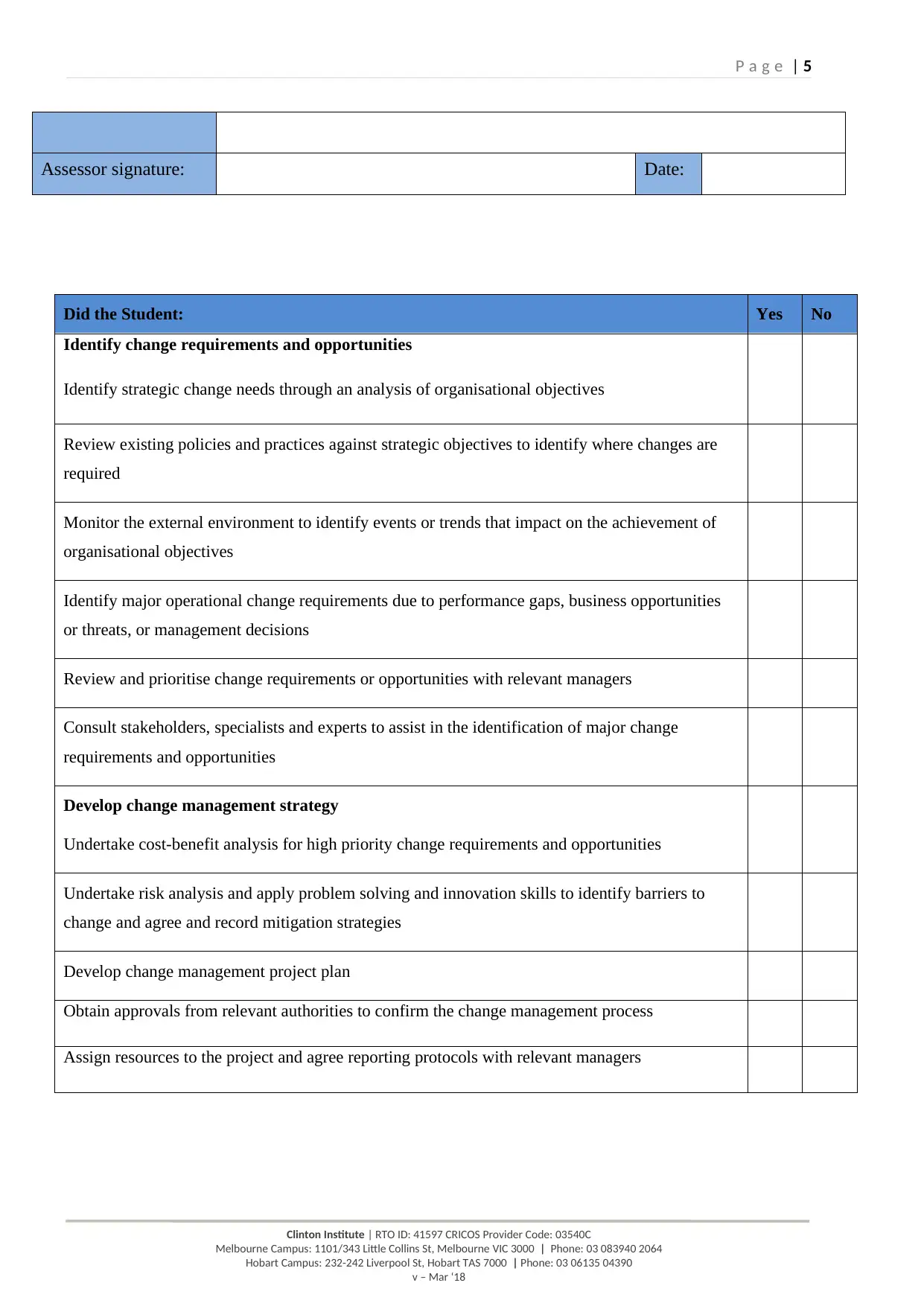
P a g e | 5
Assessor signature: Date:
Did the Student: Yes No
Identify change requirements and opportunities
Identify strategic change needs through an analysis of organisational objectives
Review existing policies and practices against strategic objectives to identify where changes are
required
Monitor the external environment to identify events or trends that impact on the achievement of
organisational objectives
Identify major operational change requirements due to performance gaps, business opportunities
or threats, or management decisions
Review and prioritise change requirements or opportunities with relevant managers
Consult stakeholders, specialists and experts to assist in the identification of major change
requirements and opportunities
Develop change management strategy
Undertake cost-benefit analysis for high priority change requirements and opportunities
Undertake risk analysis and apply problem solving and innovation skills to identify barriers to
change and agree and record mitigation strategies
Develop change management project plan
Obtain approvals from relevant authorities to confirm the change management process
Assign resources to the project and agree reporting protocols with relevant managers
Clinton Institute | RTO ID: 41597 CRICOS Provider Code: 03540C
Melbourne Campus: 1101/343 Little Collins St, Melbourne VIC 3000 | Phone: 03 083940 2064
Hobart Campus: 232-242 Liverpool St, Hobart TAS 7000 | Phone: 03 06135 04390
v – Mar ‘18
Assessor signature: Date:
Did the Student: Yes No
Identify change requirements and opportunities
Identify strategic change needs through an analysis of organisational objectives
Review existing policies and practices against strategic objectives to identify where changes are
required
Monitor the external environment to identify events or trends that impact on the achievement of
organisational objectives
Identify major operational change requirements due to performance gaps, business opportunities
or threats, or management decisions
Review and prioritise change requirements or opportunities with relevant managers
Consult stakeholders, specialists and experts to assist in the identification of major change
requirements and opportunities
Develop change management strategy
Undertake cost-benefit analysis for high priority change requirements and opportunities
Undertake risk analysis and apply problem solving and innovation skills to identify barriers to
change and agree and record mitigation strategies
Develop change management project plan
Obtain approvals from relevant authorities to confirm the change management process
Assign resources to the project and agree reporting protocols with relevant managers
Clinton Institute | RTO ID: 41597 CRICOS Provider Code: 03540C
Melbourne Campus: 1101/343 Little Collins St, Melbourne VIC 3000 | Phone: 03 083940 2064
Hobart Campus: 232-242 Liverpool St, Hobart TAS 7000 | Phone: 03 06135 04390
v – Mar ‘18
⊘ This is a preview!⊘
Do you want full access?
Subscribe today to unlock all pages.

Trusted by 1+ million students worldwide
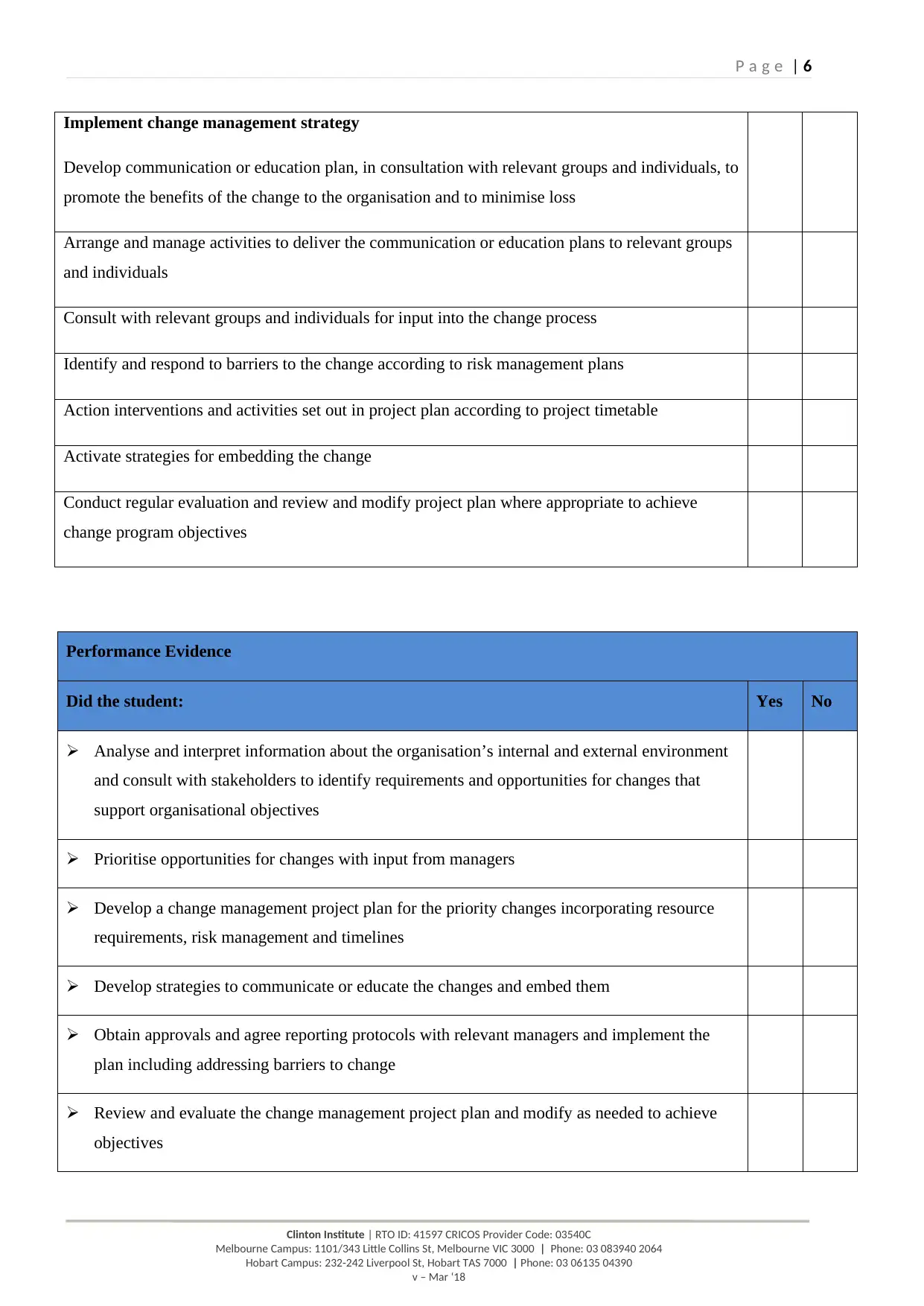
P a g e | 6
Implement change management strategy
Develop communication or education plan, in consultation with relevant groups and individuals, to
promote the benefits of the change to the organisation and to minimise loss
Arrange and manage activities to deliver the communication or education plans to relevant groups
and individuals
Consult with relevant groups and individuals for input into the change process
Identify and respond to barriers to the change according to risk management plans
Action interventions and activities set out in project plan according to project timetable
Activate strategies for embedding the change
Conduct regular evaluation and review and modify project plan where appropriate to achieve
change program objectives
Performance Evidence
Did the student: Yes No
Analyse and interpret information about the organisation’s internal and external environment
and consult with stakeholders to identify requirements and opportunities for changes that
support organisational objectives
Prioritise opportunities for changes with input from managers
Develop a change management project plan for the priority changes incorporating resource
requirements, risk management and timelines
Develop strategies to communicate or educate the changes and embed them
Obtain approvals and agree reporting protocols with relevant managers and implement the
plan including addressing barriers to change
Review and evaluate the change management project plan and modify as needed to achieve
objectives
Clinton Institute | RTO ID: 41597 CRICOS Provider Code: 03540C
Melbourne Campus: 1101/343 Little Collins St, Melbourne VIC 3000 | Phone: 03 083940 2064
Hobart Campus: 232-242 Liverpool St, Hobart TAS 7000 | Phone: 03 06135 04390
v – Mar ‘18
Implement change management strategy
Develop communication or education plan, in consultation with relevant groups and individuals, to
promote the benefits of the change to the organisation and to minimise loss
Arrange and manage activities to deliver the communication or education plans to relevant groups
and individuals
Consult with relevant groups and individuals for input into the change process
Identify and respond to barriers to the change according to risk management plans
Action interventions and activities set out in project plan according to project timetable
Activate strategies for embedding the change
Conduct regular evaluation and review and modify project plan where appropriate to achieve
change program objectives
Performance Evidence
Did the student: Yes No
Analyse and interpret information about the organisation’s internal and external environment
and consult with stakeholders to identify requirements and opportunities for changes that
support organisational objectives
Prioritise opportunities for changes with input from managers
Develop a change management project plan for the priority changes incorporating resource
requirements, risk management and timelines
Develop strategies to communicate or educate the changes and embed them
Obtain approvals and agree reporting protocols with relevant managers and implement the
plan including addressing barriers to change
Review and evaluate the change management project plan and modify as needed to achieve
objectives
Clinton Institute | RTO ID: 41597 CRICOS Provider Code: 03540C
Melbourne Campus: 1101/343 Little Collins St, Melbourne VIC 3000 | Phone: 03 083940 2064
Hobart Campus: 232-242 Liverpool St, Hobart TAS 7000 | Phone: 03 06135 04390
v – Mar ‘18
Paraphrase This Document
Need a fresh take? Get an instant paraphrase of this document with our AI Paraphraser
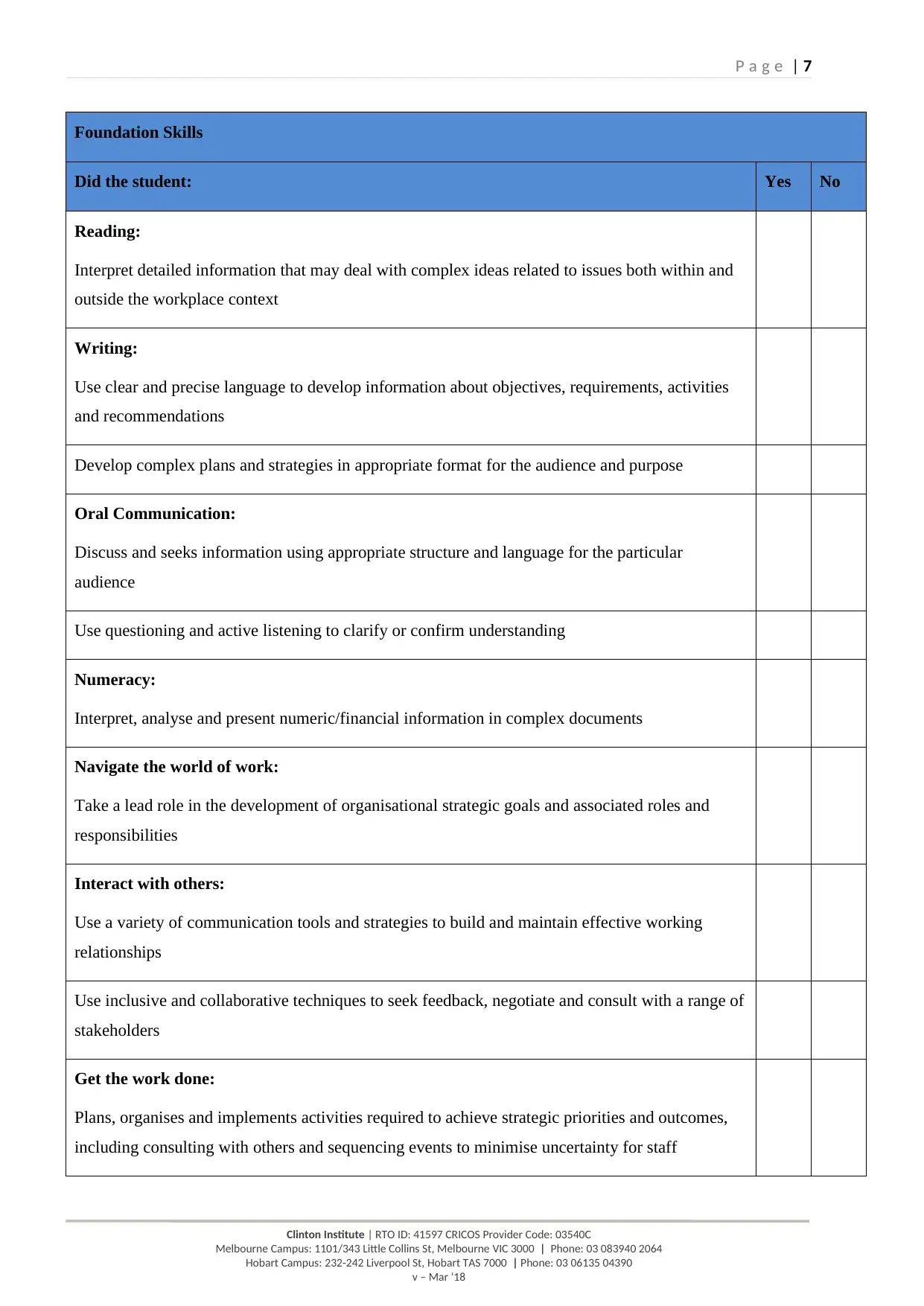
P a g e | 7
Foundation Skills
Did the student: Yes No
Reading:
Interpret detailed information that may deal with complex ideas related to issues both within and
outside the workplace context
Writing:
Use clear and precise language to develop information about objectives, requirements, activities
and recommendations
Develop complex plans and strategies in appropriate format for the audience and purpose
Oral Communication:
Discuss and seeks information using appropriate structure and language for the particular
audience
Use questioning and active listening to clarify or confirm understanding
Numeracy:
Interpret, analyse and present numeric/financial information in complex documents
Navigate the world of work:
Take a lead role in the development of organisational strategic goals and associated roles and
responsibilities
Interact with others:
Use a variety of communication tools and strategies to build and maintain effective working
relationships
Use inclusive and collaborative techniques to seek feedback, negotiate and consult with a range of
stakeholders
Get the work done:
Plans, organises and implements activities required to achieve strategic priorities and outcomes,
including consulting with others and sequencing events to minimise uncertainty for staff
Clinton Institute | RTO ID: 41597 CRICOS Provider Code: 03540C
Melbourne Campus: 1101/343 Little Collins St, Melbourne VIC 3000 | Phone: 03 083940 2064
Hobart Campus: 232-242 Liverpool St, Hobart TAS 7000 | Phone: 03 06135 04390
v – Mar ‘18
Foundation Skills
Did the student: Yes No
Reading:
Interpret detailed information that may deal with complex ideas related to issues both within and
outside the workplace context
Writing:
Use clear and precise language to develop information about objectives, requirements, activities
and recommendations
Develop complex plans and strategies in appropriate format for the audience and purpose
Oral Communication:
Discuss and seeks information using appropriate structure and language for the particular
audience
Use questioning and active listening to clarify or confirm understanding
Numeracy:
Interpret, analyse and present numeric/financial information in complex documents
Navigate the world of work:
Take a lead role in the development of organisational strategic goals and associated roles and
responsibilities
Interact with others:
Use a variety of communication tools and strategies to build and maintain effective working
relationships
Use inclusive and collaborative techniques to seek feedback, negotiate and consult with a range of
stakeholders
Get the work done:
Plans, organises and implements activities required to achieve strategic priorities and outcomes,
including consulting with others and sequencing events to minimise uncertainty for staff
Clinton Institute | RTO ID: 41597 CRICOS Provider Code: 03540C
Melbourne Campus: 1101/343 Little Collins St, Melbourne VIC 3000 | Phone: 03 083940 2064
Hobart Campus: 232-242 Liverpool St, Hobart TAS 7000 | Phone: 03 06135 04390
v – Mar ‘18
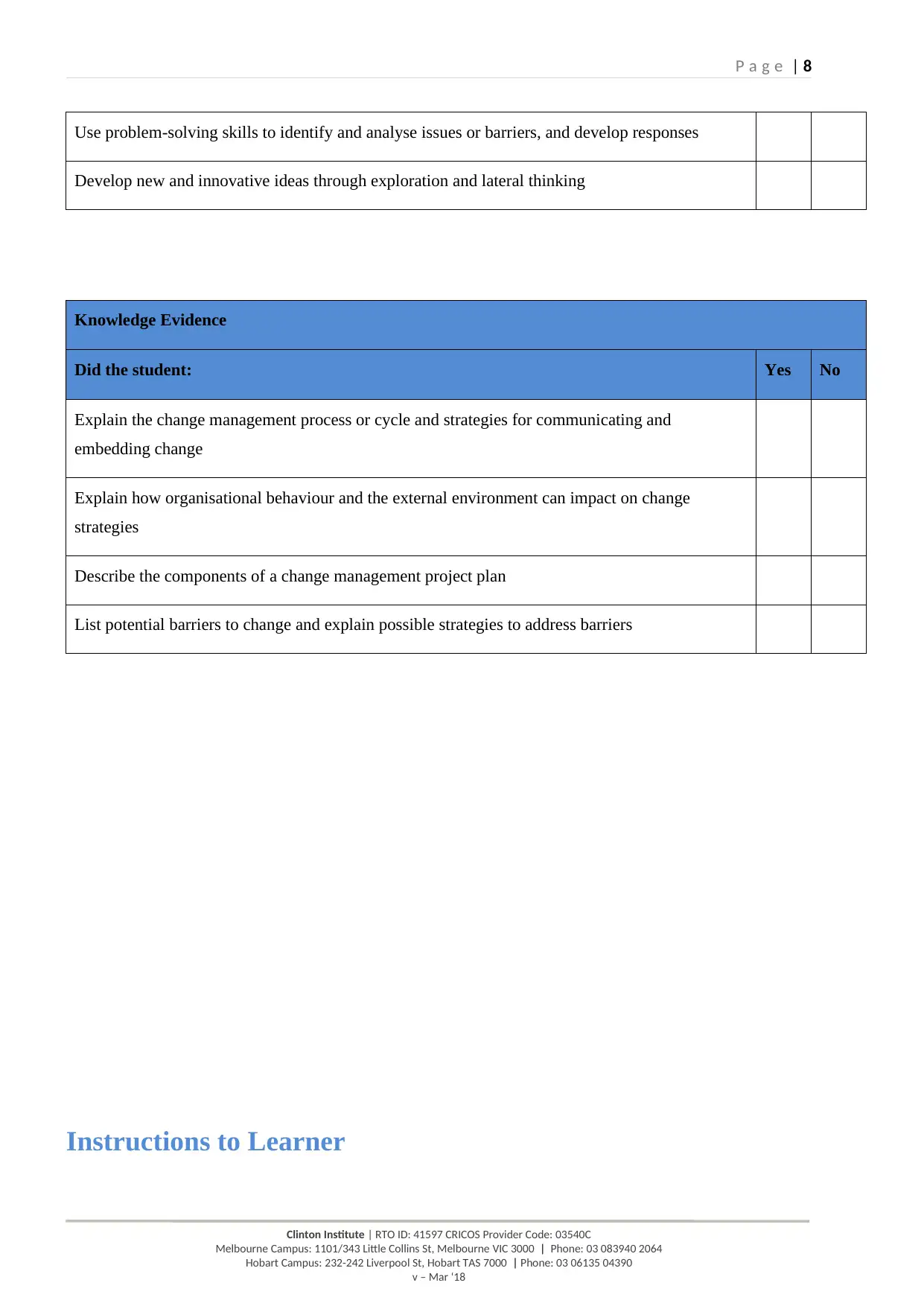
P a g e | 8
Use problem-solving skills to identify and analyse issues or barriers, and develop responses
Develop new and innovative ideas through exploration and lateral thinking
Knowledge Evidence
Did the student: Yes No
Explain the change management process or cycle and strategies for communicating and
embedding change
Explain how organisational behaviour and the external environment can impact on change
strategies
Describe the components of a change management project plan
List potential barriers to change and explain possible strategies to address barriers
Instructions to Learner
Clinton Institute | RTO ID: 41597 CRICOS Provider Code: 03540C
Melbourne Campus: 1101/343 Little Collins St, Melbourne VIC 3000 | Phone: 03 083940 2064
Hobart Campus: 232-242 Liverpool St, Hobart TAS 7000 | Phone: 03 06135 04390
v – Mar ‘18
Use problem-solving skills to identify and analyse issues or barriers, and develop responses
Develop new and innovative ideas through exploration and lateral thinking
Knowledge Evidence
Did the student: Yes No
Explain the change management process or cycle and strategies for communicating and
embedding change
Explain how organisational behaviour and the external environment can impact on change
strategies
Describe the components of a change management project plan
List potential barriers to change and explain possible strategies to address barriers
Instructions to Learner
Clinton Institute | RTO ID: 41597 CRICOS Provider Code: 03540C
Melbourne Campus: 1101/343 Little Collins St, Melbourne VIC 3000 | Phone: 03 083940 2064
Hobart Campus: 232-242 Liverpool St, Hobart TAS 7000 | Phone: 03 06135 04390
v – Mar ‘18
⊘ This is a preview!⊘
Do you want full access?
Subscribe today to unlock all pages.

Trusted by 1+ million students worldwide
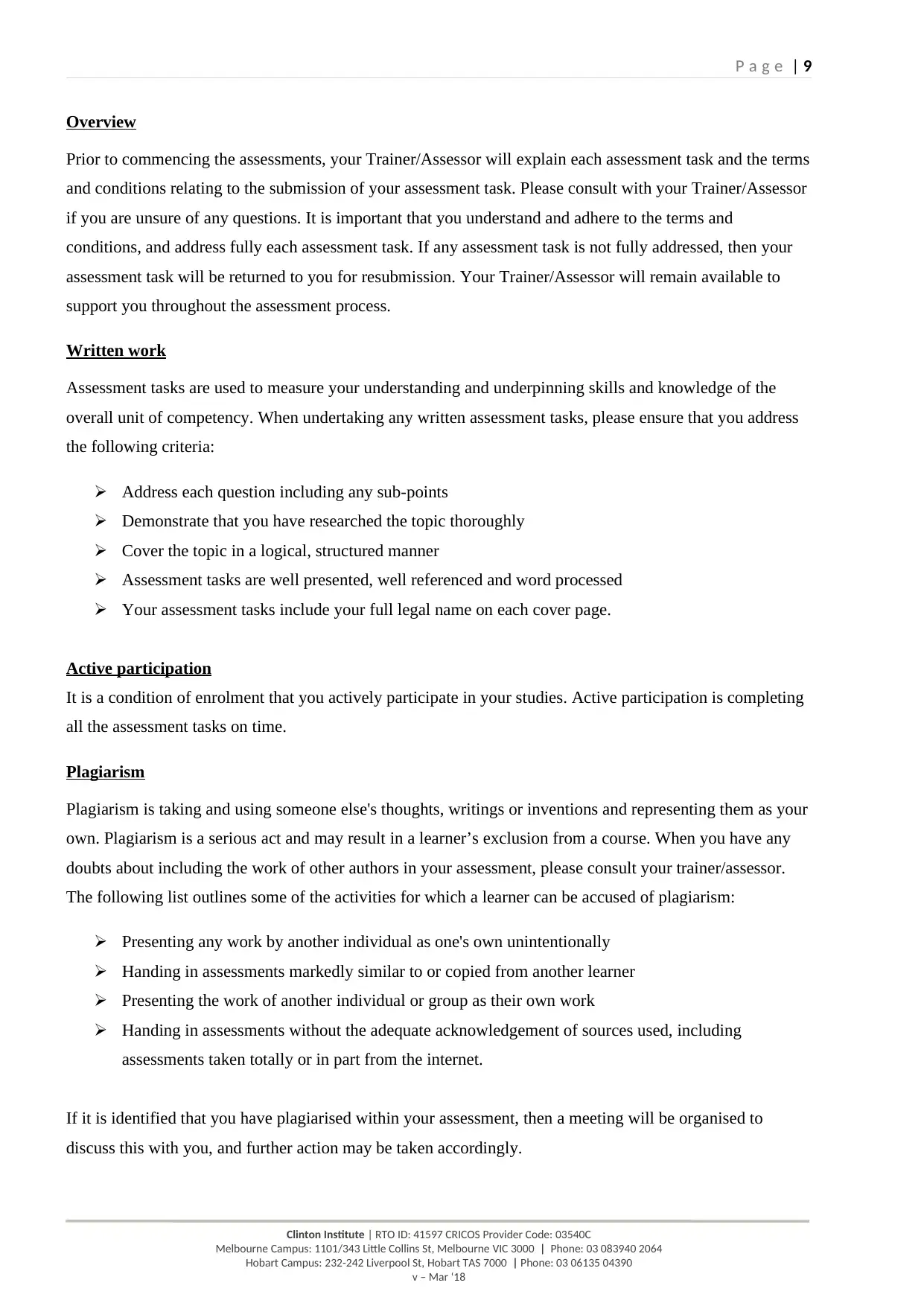
P a g e | 9
Overview
Prior to commencing the assessments, your Trainer/Assessor will explain each assessment task and the terms
and conditions relating to the submission of your assessment task. Please consult with your Trainer/Assessor
if you are unsure of any questions. It is important that you understand and adhere to the terms and
conditions, and address fully each assessment task. If any assessment task is not fully addressed, then your
assessment task will be returned to you for resubmission. Your Trainer/Assessor will remain available to
support you throughout the assessment process.
Written work
Assessment tasks are used to measure your understanding and underpinning skills and knowledge of the
overall unit of competency. When undertaking any written assessment tasks, please ensure that you address
the following criteria:
Address each question including any sub-points
Demonstrate that you have researched the topic thoroughly
Cover the topic in a logical, structured manner
Assessment tasks are well presented, well referenced and word processed
Your assessment tasks include your full legal name on each cover page.
Active participation
It is a condition of enrolment that you actively participate in your studies. Active participation is completing
all the assessment tasks on time.
Plagiarism
Plagiarism is taking and using someone else's thoughts, writings or inventions and representing them as your
own. Plagiarism is a serious act and may result in a learner’s exclusion from a course. When you have any
doubts about including the work of other authors in your assessment, please consult your trainer/assessor.
The following list outlines some of the activities for which a learner can be accused of plagiarism:
Presenting any work by another individual as one's own unintentionally
Handing in assessments markedly similar to or copied from another learner
Presenting the work of another individual or group as their own work
Handing in assessments without the adequate acknowledgement of sources used, including
assessments taken totally or in part from the internet.
If it is identified that you have plagiarised within your assessment, then a meeting will be organised to
discuss this with you, and further action may be taken accordingly.
Clinton Institute | RTO ID: 41597 CRICOS Provider Code: 03540C
Melbourne Campus: 1101/343 Little Collins St, Melbourne VIC 3000 | Phone: 03 083940 2064
Hobart Campus: 232-242 Liverpool St, Hobart TAS 7000 | Phone: 03 06135 04390
v – Mar ‘18
Overview
Prior to commencing the assessments, your Trainer/Assessor will explain each assessment task and the terms
and conditions relating to the submission of your assessment task. Please consult with your Trainer/Assessor
if you are unsure of any questions. It is important that you understand and adhere to the terms and
conditions, and address fully each assessment task. If any assessment task is not fully addressed, then your
assessment task will be returned to you for resubmission. Your Trainer/Assessor will remain available to
support you throughout the assessment process.
Written work
Assessment tasks are used to measure your understanding and underpinning skills and knowledge of the
overall unit of competency. When undertaking any written assessment tasks, please ensure that you address
the following criteria:
Address each question including any sub-points
Demonstrate that you have researched the topic thoroughly
Cover the topic in a logical, structured manner
Assessment tasks are well presented, well referenced and word processed
Your assessment tasks include your full legal name on each cover page.
Active participation
It is a condition of enrolment that you actively participate in your studies. Active participation is completing
all the assessment tasks on time.
Plagiarism
Plagiarism is taking and using someone else's thoughts, writings or inventions and representing them as your
own. Plagiarism is a serious act and may result in a learner’s exclusion from a course. When you have any
doubts about including the work of other authors in your assessment, please consult your trainer/assessor.
The following list outlines some of the activities for which a learner can be accused of plagiarism:
Presenting any work by another individual as one's own unintentionally
Handing in assessments markedly similar to or copied from another learner
Presenting the work of another individual or group as their own work
Handing in assessments without the adequate acknowledgement of sources used, including
assessments taken totally or in part from the internet.
If it is identified that you have plagiarised within your assessment, then a meeting will be organised to
discuss this with you, and further action may be taken accordingly.
Clinton Institute | RTO ID: 41597 CRICOS Provider Code: 03540C
Melbourne Campus: 1101/343 Little Collins St, Melbourne VIC 3000 | Phone: 03 083940 2064
Hobart Campus: 232-242 Liverpool St, Hobart TAS 7000 | Phone: 03 06135 04390
v – Mar ‘18
Paraphrase This Document
Need a fresh take? Get an instant paraphrase of this document with our AI Paraphraser
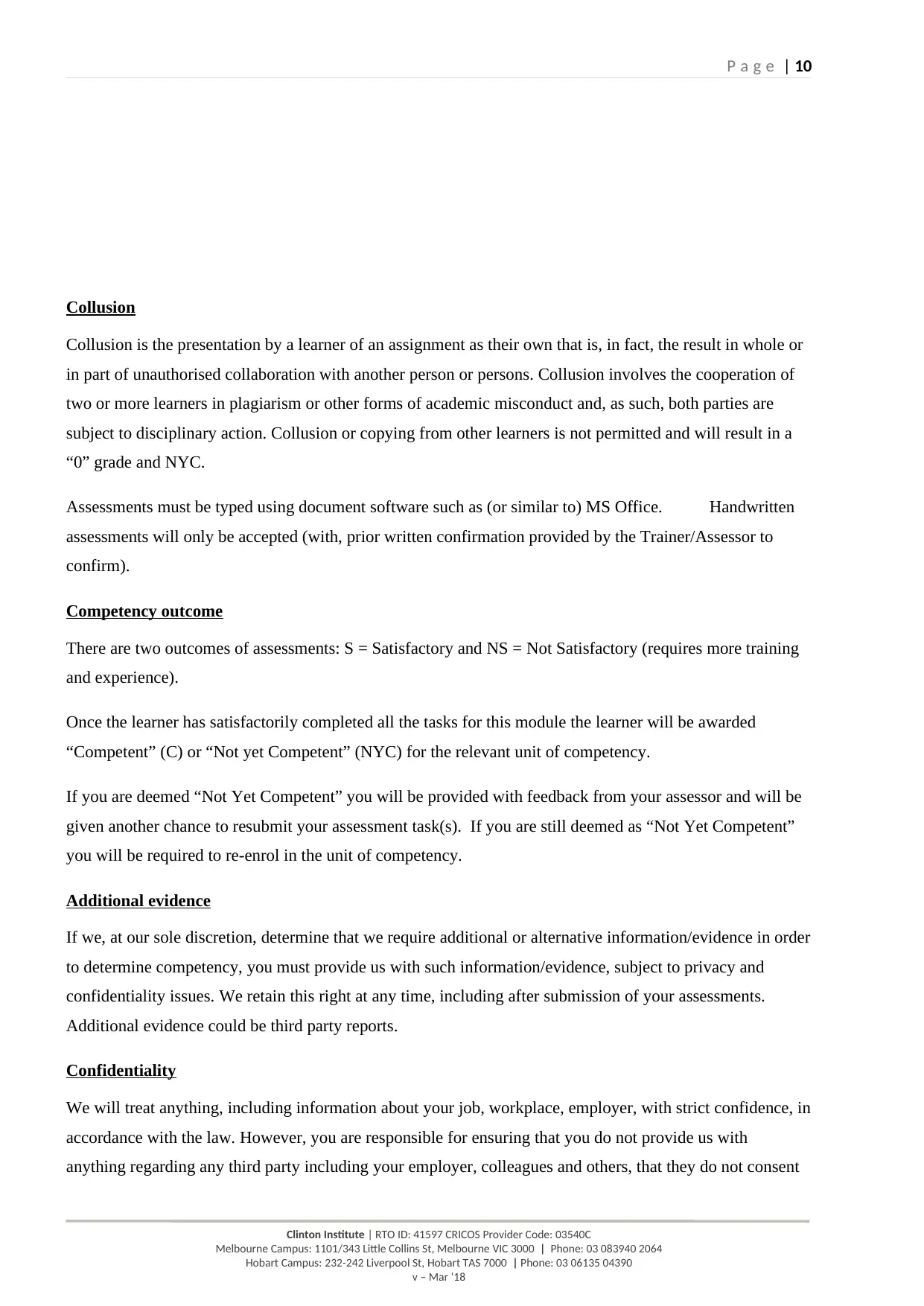
P a g e | 10
Collusion
Collusion is the presentation by a learner of an assignment as their own that is, in fact, the result in whole or
in part of unauthorised collaboration with another person or persons. Collusion involves the cooperation of
two or more learners in plagiarism or other forms of academic misconduct and, as such, both parties are
subject to disciplinary action. Collusion or copying from other learners is not permitted and will result in a
“0” grade and NYC.
Assessments must be typed using document software such as (or similar to) MS Office. Handwritten
assessments will only be accepted (with, prior written confirmation provided by the Trainer/Assessor to
confirm).
Competency outcome
There are two outcomes of assessments: S = Satisfactory and NS = Not Satisfactory (requires more training
and experience).
Once the learner has satisfactorily completed all the tasks for this module the learner will be awarded
“Competent” (C) or “Not yet Competent” (NYC) for the relevant unit of competency.
If you are deemed “Not Yet Competent” you will be provided with feedback from your assessor and will be
given another chance to resubmit your assessment task(s). If you are still deemed as “Not Yet Competent”
you will be required to re-enrol in the unit of competency.
Additional evidence
If we, at our sole discretion, determine that we require additional or alternative information/evidence in order
to determine competency, you must provide us with such information/evidence, subject to privacy and
confidentiality issues. We retain this right at any time, including after submission of your assessments.
Additional evidence could be third party reports.
Confidentiality
We will treat anything, including information about your job, workplace, employer, with strict confidence, in
accordance with the law. However, you are responsible for ensuring that you do not provide us with
anything regarding any third party including your employer, colleagues and others, that they do not consent
Clinton Institute | RTO ID: 41597 CRICOS Provider Code: 03540C
Melbourne Campus: 1101/343 Little Collins St, Melbourne VIC 3000 | Phone: 03 083940 2064
Hobart Campus: 232-242 Liverpool St, Hobart TAS 7000 | Phone: 03 06135 04390
v – Mar ‘18
Collusion
Collusion is the presentation by a learner of an assignment as their own that is, in fact, the result in whole or
in part of unauthorised collaboration with another person or persons. Collusion involves the cooperation of
two or more learners in plagiarism or other forms of academic misconduct and, as such, both parties are
subject to disciplinary action. Collusion or copying from other learners is not permitted and will result in a
“0” grade and NYC.
Assessments must be typed using document software such as (or similar to) MS Office. Handwritten
assessments will only be accepted (with, prior written confirmation provided by the Trainer/Assessor to
confirm).
Competency outcome
There are two outcomes of assessments: S = Satisfactory and NS = Not Satisfactory (requires more training
and experience).
Once the learner has satisfactorily completed all the tasks for this module the learner will be awarded
“Competent” (C) or “Not yet Competent” (NYC) for the relevant unit of competency.
If you are deemed “Not Yet Competent” you will be provided with feedback from your assessor and will be
given another chance to resubmit your assessment task(s). If you are still deemed as “Not Yet Competent”
you will be required to re-enrol in the unit of competency.
Additional evidence
If we, at our sole discretion, determine that we require additional or alternative information/evidence in order
to determine competency, you must provide us with such information/evidence, subject to privacy and
confidentiality issues. We retain this right at any time, including after submission of your assessments.
Additional evidence could be third party reports.
Confidentiality
We will treat anything, including information about your job, workplace, employer, with strict confidence, in
accordance with the law. However, you are responsible for ensuring that you do not provide us with
anything regarding any third party including your employer, colleagues and others, that they do not consent
Clinton Institute | RTO ID: 41597 CRICOS Provider Code: 03540C
Melbourne Campus: 1101/343 Little Collins St, Melbourne VIC 3000 | Phone: 03 083940 2064
Hobart Campus: 232-242 Liverpool St, Hobart TAS 7000 | Phone: 03 06135 04390
v – Mar ‘18
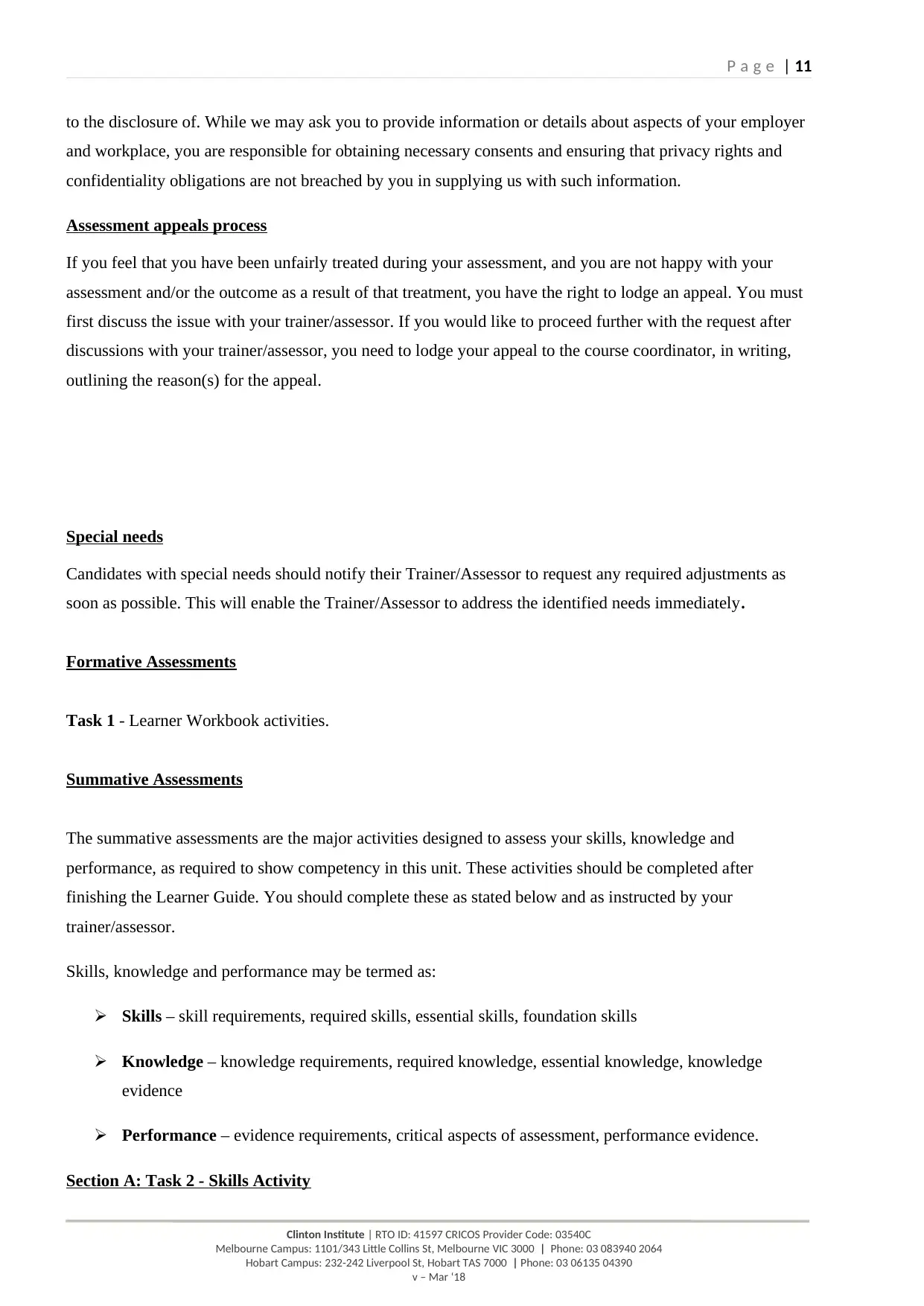
P a g e | 11
to the disclosure of. While we may ask you to provide information or details about aspects of your employer
and workplace, you are responsible for obtaining necessary consents and ensuring that privacy rights and
confidentiality obligations are not breached by you in supplying us with such information.
Assessment appeals process
If you feel that you have been unfairly treated during your assessment, and you are not happy with your
assessment and/or the outcome as a result of that treatment, you have the right to lodge an appeal. You must
first discuss the issue with your trainer/assessor. If you would like to proceed further with the request after
discussions with your trainer/assessor, you need to lodge your appeal to the course coordinator, in writing,
outlining the reason(s) for the appeal.
Special needs
Candidates with special needs should notify their Trainer/Assessor to request any required adjustments as
soon as possible. This will enable the Trainer/Assessor to address the identified needs immediately .
Formative Assessments
Task 1 - Learner Workbook activities.
Summative Assessments
The summative assessments are the major activities designed to assess your skills, knowledge and
performance, as required to show competency in this unit. These activities should be completed after
finishing the Learner Guide. You should complete these as stated below and as instructed by your
trainer/assessor.
Skills, knowledge and performance may be termed as:
Skills – skill requirements, required skills, essential skills, foundation skills
Knowledge – knowledge requirements, required knowledge, essential knowledge, knowledge
evidence
Performance – evidence requirements, critical aspects of assessment, performance evidence.
Section A: Task 2 - Skills Activity
Clinton Institute | RTO ID: 41597 CRICOS Provider Code: 03540C
Melbourne Campus: 1101/343 Little Collins St, Melbourne VIC 3000 | Phone: 03 083940 2064
Hobart Campus: 232-242 Liverpool St, Hobart TAS 7000 | Phone: 03 06135 04390
v – Mar ‘18
to the disclosure of. While we may ask you to provide information or details about aspects of your employer
and workplace, you are responsible for obtaining necessary consents and ensuring that privacy rights and
confidentiality obligations are not breached by you in supplying us with such information.
Assessment appeals process
If you feel that you have been unfairly treated during your assessment, and you are not happy with your
assessment and/or the outcome as a result of that treatment, you have the right to lodge an appeal. You must
first discuss the issue with your trainer/assessor. If you would like to proceed further with the request after
discussions with your trainer/assessor, you need to lodge your appeal to the course coordinator, in writing,
outlining the reason(s) for the appeal.
Special needs
Candidates with special needs should notify their Trainer/Assessor to request any required adjustments as
soon as possible. This will enable the Trainer/Assessor to address the identified needs immediately .
Formative Assessments
Task 1 - Learner Workbook activities.
Summative Assessments
The summative assessments are the major activities designed to assess your skills, knowledge and
performance, as required to show competency in this unit. These activities should be completed after
finishing the Learner Guide. You should complete these as stated below and as instructed by your
trainer/assessor.
Skills, knowledge and performance may be termed as:
Skills – skill requirements, required skills, essential skills, foundation skills
Knowledge – knowledge requirements, required knowledge, essential knowledge, knowledge
evidence
Performance – evidence requirements, critical aspects of assessment, performance evidence.
Section A: Task 2 - Skills Activity
Clinton Institute | RTO ID: 41597 CRICOS Provider Code: 03540C
Melbourne Campus: 1101/343 Little Collins St, Melbourne VIC 3000 | Phone: 03 083940 2064
Hobart Campus: 232-242 Liverpool St, Hobart TAS 7000 | Phone: 03 06135 04390
v – Mar ‘18
⊘ This is a preview!⊘
Do you want full access?
Subscribe today to unlock all pages.

Trusted by 1+ million students worldwide
1 out of 91
Your All-in-One AI-Powered Toolkit for Academic Success.
+13062052269
info@desklib.com
Available 24*7 on WhatsApp / Email
![[object Object]](/_next/static/media/star-bottom.7253800d.svg)
Unlock your academic potential
Copyright © 2020–2026 A2Z Services. All Rights Reserved. Developed and managed by ZUCOL.